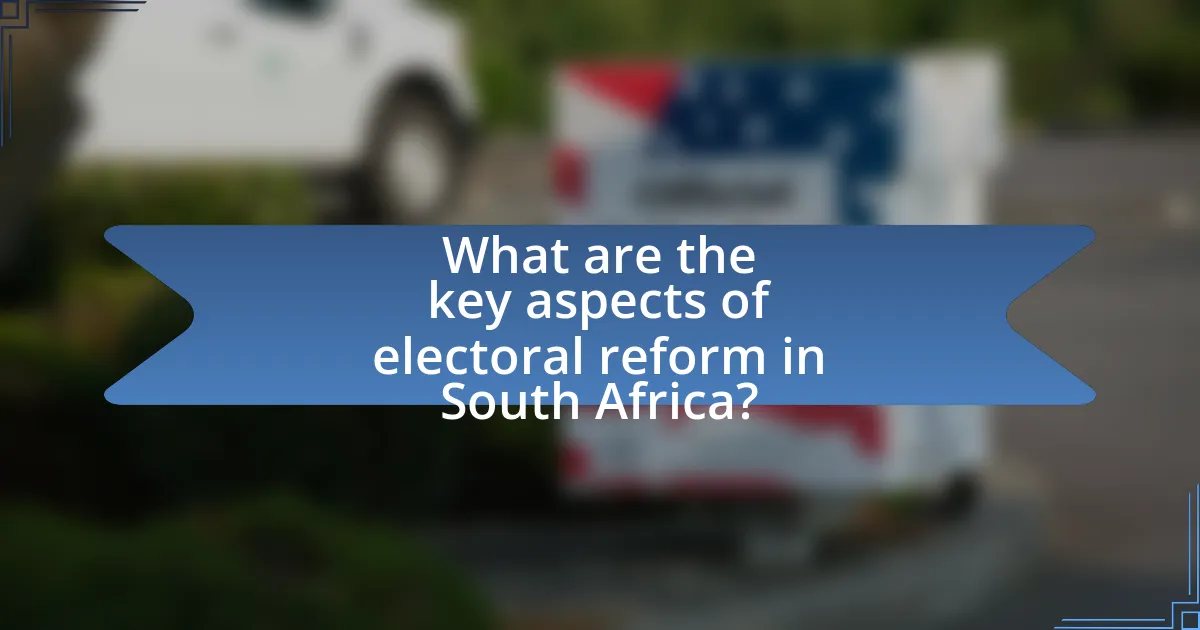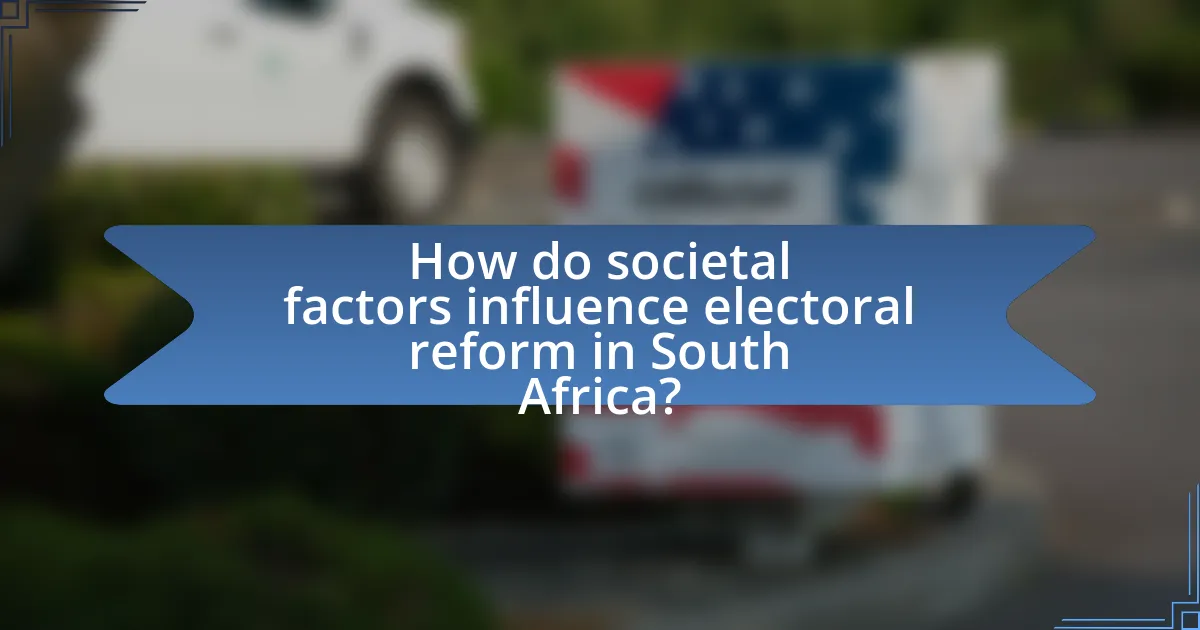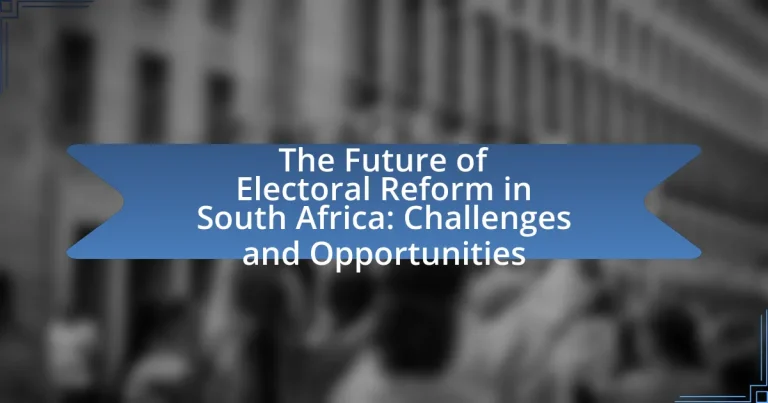The article focuses on the future of electoral reform in South Africa, highlighting key aspects such as proportional representation, the establishment of an independent electoral commission, and enhanced voter accessibility. It examines the evolution of the electoral system since the end of apartheid, significant historical events that have shaped reforms, and current electoral laws. The article also addresses challenges like political party funding, voter engagement, and corruption, while exploring opportunities for improvement through technology and public trust. Additionally, it discusses the role of civil society and grassroots movements in advocating for reform, the implications of these changes for democracy, and best practices from other countries that could inform South Africa’s electoral landscape.

What are the key aspects of electoral reform in South Africa?
The key aspects of electoral reform in South Africa include the introduction of proportional representation, the establishment of an independent electoral commission, and the enhancement of voter accessibility. Proportional representation ensures that political parties gain seats in the legislature in proportion to the votes they receive, promoting a more representative democracy. The Electoral Commission of South Africa (IEC), established in 1996, operates independently to oversee free and fair elections, ensuring transparency and integrity in the electoral process. Additionally, reforms have focused on improving voter accessibility through measures such as extending voting hours, providing information in multiple languages, and facilitating registration processes, which aim to increase voter turnout and participation.
How has the electoral system evolved in South Africa?
The electoral system in South Africa has evolved significantly since the end of apartheid in 1994, transitioning from a racially exclusive system to a universal suffrage model. Initially, the apartheid regime enforced a system where only white citizens could vote, but the 1994 democratic elections marked a pivotal change, allowing all South Africans to participate in the electoral process. This shift was formalized through the adoption of a proportional representation system, which aimed to ensure that the composition of the legislature reflects the diverse demographics of the country. The Electoral Commission of South Africa was established to oversee free and fair elections, further solidifying democratic principles. Since then, the system has undergone various reforms to enhance transparency and accessibility, including the introduction of electronic voting machines and measures to improve voter registration. These changes reflect ongoing efforts to address challenges such as voter apathy and electoral integrity, demonstrating a commitment to strengthening democracy in South Africa.
What historical events have influenced electoral reform?
Key historical events that have influenced electoral reform include the end of apartheid in South Africa in 1994, which led to the establishment of a democratic electoral system, and the adoption of the Electoral Act of 1998, which formalized the processes for free and fair elections. The transition from a racially segregated political system to one that promotes universal suffrage marked a significant shift in governance and representation. Additionally, the Constitutional Court rulings on electoral matters have further shaped the legal framework governing elections, ensuring compliance with democratic principles. These events collectively underscore the evolution of electoral practices in South Africa, reflecting the ongoing challenges and opportunities for reform.
What are the current electoral laws in South Africa?
The current electoral laws in South Africa are primarily governed by the Electoral Act of 1998, which has undergone several amendments to enhance the electoral process. This legislation outlines the framework for conducting free and fair elections, including provisions for voter registration, the conduct of political parties, and the management of the electoral process by the Electoral Commission of South Africa (IEC). The Act mandates that elections must be held every five years, and it ensures that all eligible citizens have the right to vote. Additionally, the laws stipulate the procedures for the nomination of candidates and the voting process, ensuring transparency and accountability in the electoral system.
What challenges does South Africa face regarding electoral reform?
South Africa faces significant challenges regarding electoral reform, primarily including issues of political party funding, electoral system representation, and voter engagement. Political party funding remains a contentious issue, as the lack of transparency and regulation can lead to unequal access to resources, undermining fair competition among parties. Additionally, the current electoral system, which is based on proportional representation, has been criticized for not adequately reflecting the diversity of voter preferences, leading to calls for alternative systems that could enhance representation. Voter engagement is another critical challenge, as low turnout rates, particularly among young voters, indicate a disconnect between the electorate and the political process, necessitating reforms to increase participation and trust in the electoral system. These challenges highlight the complexities South Africa must navigate to achieve effective electoral reform.
How does corruption impact the electoral process?
Corruption significantly undermines the electoral process by eroding public trust and distorting democratic outcomes. When corruption occurs, it often leads to the manipulation of votes, bribery of officials, and the disenfranchisement of voters, which can skew election results in favor of corrupt candidates. For instance, a study by Transparency International indicates that countries with high levels of corruption experience lower voter turnout and increased electoral fraud, as citizens lose faith in the integrity of the electoral system. This manipulation not only compromises the legitimacy of elected officials but also perpetuates a cycle of corruption, as those in power may prioritize self-interest over public service.
What role does public trust play in electoral reform?
Public trust is essential in electoral reform as it underpins the legitimacy and acceptance of the electoral process. When citizens trust the electoral system, they are more likely to participate in elections, which enhances democratic engagement and accountability. Research indicates that high levels of public trust correlate with increased voter turnout; for instance, a study by the Electoral Commission of South Africa found that trust in electoral institutions significantly influences citizens’ willingness to vote. Therefore, fostering public trust through transparent processes and accountability measures is crucial for successful electoral reform in South Africa.
What opportunities exist for improving the electoral system?
Opportunities for improving the electoral system in South Africa include implementing proportional representation, enhancing voter education, and adopting technology for secure voting. Proportional representation can ensure that all voices are represented in Parliament, as evidenced by countries like Germany, where this system has led to a more diverse political landscape. Enhancing voter education can increase participation and informed decision-making, as seen in initiatives by organizations like the Electoral Commission of South Africa, which aim to educate citizens about their voting rights and processes. Additionally, adopting technology, such as electronic voting machines, can streamline the voting process and reduce fraud, as demonstrated in countries like Canada, where technology has improved efficiency and security in elections.
How can technology enhance electoral processes?
Technology can enhance electoral processes by improving voter accessibility, increasing transparency, and streamlining the voting procedure. For instance, electronic voting machines and online voter registration systems facilitate easier access for voters, particularly in remote areas, thereby increasing participation rates. A study by the International Institute for Democracy and Electoral Assistance found that countries using technology in elections saw a 10-15% increase in voter turnout. Additionally, blockchain technology can provide secure and transparent voting records, reducing the risk of fraud and increasing public trust in the electoral system. The implementation of these technologies has been shown to lead to more efficient and reliable electoral outcomes.
What reforms have been proposed by political parties?
Political parties in South Africa have proposed several electoral reforms aimed at enhancing democratic processes. The African National Congress (ANC) has suggested implementing a mixed-member proportional representation system to improve voter representation. The Democratic Alliance (DA) advocates for the introduction of a direct election system for the President to increase accountability. The Economic Freedom Fighters (EFF) have called for the abolition of the Electoral College and the establishment of a single national ballot to simplify the voting process. These proposals reflect a consensus among parties on the need for reforms to address challenges in the current electoral system, such as voter disenfranchisement and lack of accountability.

How do societal factors influence electoral reform in South Africa?
Societal factors significantly influence electoral reform in South Africa by shaping public opinion, political engagement, and the demand for accountability. The diverse demographics, including race, class, and geographic disparities, create varying expectations for representation and governance. For instance, the legacy of apartheid continues to affect voter behavior and trust in political institutions, leading to calls for reforms that enhance inclusivity and transparency. Additionally, social movements and civil society organizations actively advocate for changes in the electoral system, reflecting the population’s desire for a more equitable political landscape. These societal dynamics underscore the necessity for reforms that address historical injustices and promote democratic participation, as evidenced by the ongoing debates surrounding proportional representation and the electoral process.
What is the role of civil society in advocating for electoral reform?
Civil society plays a crucial role in advocating for electoral reform by mobilizing public opinion, promoting transparency, and holding government accountable. Organizations within civil society, such as non-governmental organizations and grassroots movements, engage in activities like awareness campaigns, research, and lobbying to influence policy changes. For instance, in South Africa, groups like the Electoral Institute for Sustainable Democracy in Africa have actively worked to highlight electoral issues and propose reforms, contributing to a more informed electorate and fostering democratic practices. Their efforts are essential in ensuring that electoral processes are fair, inclusive, and representative of the population’s needs.
How do grassroots movements impact electoral change?
Grassroots movements significantly impact electoral change by mobilizing public support and influencing policy agendas. These movements often arise from community-level concerns, enabling citizens to advocate for reforms that reflect their needs and priorities. For instance, the #FeesMustFall movement in South Africa galvanized widespread student activism, leading to changes in higher education funding policies. This demonstrates how grassroots efforts can shift political discourse and compel decision-makers to address specific issues, ultimately affecting electoral outcomes and reform initiatives.
What are the perspectives of marginalized communities on electoral reform?
Marginalized communities in South Africa view electoral reform as essential for achieving equitable representation and addressing systemic inequalities. They emphasize the need for reforms that enhance access to the electoral process, such as proportional representation and measures to reduce barriers to voting, which historically disenfranchised these groups. Research indicates that marginalized populations, including those from low-income backgrounds and racial minorities, advocate for reforms that ensure their voices are heard and that political power is not concentrated among a few elite groups. For instance, a study by the Electoral Institute for Sustainable Democracy in Africa highlights that inclusive electoral systems can lead to better governance and increased trust in political institutions among these communities.
How does public opinion shape electoral reform initiatives?
Public opinion significantly influences electoral reform initiatives by reflecting the electorate’s preferences and demands for change. When a substantial portion of the public expresses dissatisfaction with the current electoral system, policymakers are often compelled to consider reforms that align with these sentiments. For instance, surveys conducted in South Africa have shown that a majority of citizens support changes to the electoral system to enhance accountability and representation, prompting political leaders to propose reforms such as proportional representation or changes in voting procedures. This responsiveness to public sentiment is crucial, as it can lead to legislative action and the implementation of reforms that address the concerns of the electorate, thereby shaping the future of electoral processes in the country.
What methods are used to gauge public sentiment on electoral issues?
Surveys and polls are primary methods used to gauge public sentiment on electoral issues. These tools collect quantitative data from a representative sample of the population, allowing researchers to analyze opinions on various electoral topics. For instance, organizations like the South African Institute of Race Relations conduct regular surveys to assess voter attitudes and preferences, providing insights into public sentiment regarding electoral reforms and political parties. Additionally, social media analysis is increasingly utilized to track real-time public opinions and trends, as platforms like Twitter and Facebook reflect immediate reactions to electoral events and policies.
How can public engagement be increased in the electoral process?
Public engagement in the electoral process can be increased through targeted educational initiatives and the use of technology. Educational programs that inform citizens about the electoral process, voting rights, and the importance of participation can empower individuals to engage more actively. For instance, research by the Electoral Commission of South Africa indicates that voter education campaigns significantly enhance turnout rates, particularly among young voters. Additionally, leveraging technology, such as mobile applications and social media platforms, can facilitate easier access to information and encourage discussions about electoral issues, thereby fostering a more informed electorate.
What are the implications of electoral reform for South Africa’s democracy?
Electoral reform in South Africa has significant implications for its democracy, primarily by enhancing political representation and accountability. Reforms such as the introduction of proportional representation have the potential to diversify the political landscape, allowing for a broader range of voices and interests to be represented in government. For instance, the 1994 electoral system change led to increased representation of previously marginalized groups, which has been crucial for fostering inclusivity in South African politics. Additionally, reforms aimed at improving electoral integrity, such as stricter regulations on campaign financing and the establishment of independent electoral commissions, can strengthen public trust in the electoral process. This trust is vital for democratic stability, as evidenced by the decline in voter turnout in recent elections, which indicates growing disillusionment with the political system. Therefore, electoral reform can play a pivotal role in revitalizing South Africa’s democracy by promoting fair representation and restoring confidence in political institutions.
How can electoral reform strengthen democratic governance?
Electoral reform can strengthen democratic governance by enhancing the fairness and inclusivity of the electoral process. By implementing measures such as proportional representation, electoral reforms can ensure that diverse voices are represented in government, thereby increasing public trust and participation. For instance, countries that have adopted proportional representation systems, like Germany, have seen higher voter turnout and greater satisfaction with democratic processes, as these systems allow for a broader spectrum of political opinions to be represented. This inclusivity can lead to more responsive governance, as elected officials are held accountable to a wider array of constituents.
What are the potential impacts on voter participation?
The potential impacts on voter participation include increased engagement and turnout, as well as potential disenfranchisement. Electoral reforms, such as the introduction of online voting and improved accessibility measures, can enhance participation by making the voting process more convenient and inclusive. For instance, studies have shown that countries implementing online voting have seen a rise in voter turnout by up to 10%. Conversely, reforms that complicate the voting process, such as stringent voter ID laws, can lead to decreased participation, particularly among marginalized groups. Research indicates that states with strict ID requirements have experienced a drop in voter turnout by approximately 2-3%. Thus, the design and implementation of electoral reforms significantly influence voter participation rates.
How does electoral reform affect political accountability?
Electoral reform enhances political accountability by creating a more transparent and representative electoral process. When electoral systems are reformed, such as through the introduction of proportional representation or ranked-choice voting, they can reduce the influence of money in politics and increase voter engagement. For instance, studies have shown that countries with proportional representation tend to have higher voter turnout and more diverse political representation, which fosters accountability as elected officials are more directly answerable to a broader electorate. Additionally, reforms that promote transparency, such as mandatory disclosure of campaign financing, enable voters to hold politicians accountable for their actions and decisions. This connection between electoral reform and accountability is supported by evidence from various democracies, where reforms have led to increased scrutiny of elected officials and improved governance outcomes.
What best practices can be adopted from other countries?
Best practices that can be adopted from other countries include implementing proportional representation systems, enhancing voter education programs, and utilizing technology for transparent electoral processes. Countries like Germany and New Zealand have successfully employed mixed-member proportional representation, which allows for a more accurate reflection of voter preferences in legislative bodies. Additionally, Finland’s comprehensive voter education initiatives have resulted in high voter turnout and informed electorates, demonstrating the importance of educating citizens about the electoral process. Furthermore, the use of electronic voting systems in Estonia has increased transparency and efficiency, providing a model for South Africa to consider in modernizing its electoral framework.
What lessons can South Africa learn from successful electoral reforms elsewhere?
South Africa can learn the importance of proportional representation from successful electoral reforms in countries like Germany and New Zealand. These nations have implemented systems that ensure a more accurate reflection of voter preferences in legislative bodies, leading to increased political diversity and representation. For instance, Germany’s mixed-member proportional representation system allows voters to cast two votes—one for a party and another for a candidate—resulting in a parliament that mirrors the electorate’s political spectrum. This approach has contributed to political stability and coalition governance, which can mitigate the risks of a dominant party system. Similarly, New Zealand’s shift to a mixed-member proportional system in 1996 enhanced voter engagement and satisfaction, as evidenced by increased voter turnout and public trust in the electoral process. By adopting similar reforms, South Africa could enhance its democratic legitimacy and address issues of underrepresentation and voter apathy.
How can international organizations support South Africa’s electoral reform efforts?
International organizations can support South Africa’s electoral reform efforts by providing technical assistance, funding, and facilitating dialogue among stakeholders. For instance, organizations like the United Nations and the African Union can offer expertise in best practices for electoral processes, which can enhance the integrity and transparency of elections. Additionally, financial support from these organizations can help implement reforms such as voter education programs and the modernization of electoral infrastructure. Historical examples include the role of international observers in previous South African elections, which helped to ensure credibility and public trust in the electoral process.
What practical steps can citizens take to advocate for electoral reform?
Citizens can advocate for electoral reform by organizing grassroots campaigns to raise awareness and mobilize support. These campaigns can include community meetings, social media outreach, and partnerships with local organizations to educate the public on the importance of reform. Evidence from successful movements, such as the 2016 #FeesMustFall campaign in South Africa, demonstrates that collective action can effectively influence policy changes. Additionally, citizens can engage with their elected representatives by attending town hall meetings, submitting petitions, and participating in public consultations to express their demands for reform. Research indicates that direct engagement with policymakers increases the likelihood of legislative changes, as seen in various democratic movements worldwide.

